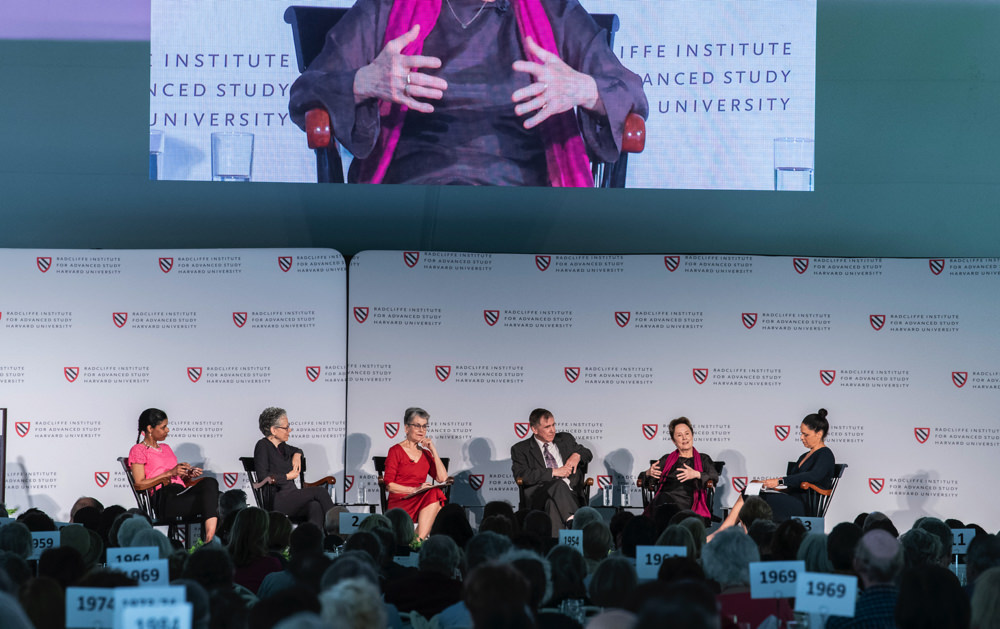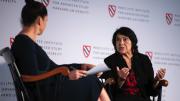A few moments after a Radcliffe Day conversation between Soledad O’Brien ’88 and Dolores Huerta—the labor and civil-rights activist who co-founded the National Farmworkers Association (now the United Farm Workers)—seemed to have ended, Huerta stood up to make one more statement. “I have a request of you,” she said. “Alumni here, of Harvard, please address the [Harvard] president, say, ‘Sign that contract with your workers,’ okay?” (a reference to University negotiations with the Harvard Graduate Student Union). She then led the audience of several hundred in a chant:
Who’s got the power?
We’ve got the power!
What kind of power?
People power!
¡Sí se puede!
In the conversation, O’Brien and Huerta, the 2019 Radcliffe Medal recipient, discussed Huerta’s behind-the-scenes coordination during the Delano grape strike (a five-year labor strike in California beginning in 1965), the process of learning how to negotiate union contracts, and the Internet’s role in activism. Huerta repeatedly emphasized that her goal throughout life, and through the Dolores Huerta Foundation, is to make people realize that they have power. “They may not speak English, they may not be citizens of the United States, they might be very, very poor,” she said. “But the one thing is—and I think something that all of us have to really understand—that the power is in our person.”
Huerta recalled having to convince workers of their power as the National Farmworkers Association was just getting started. “I remember one of the farmworkers said, ‘We will put a man on the moon before farmworkers get unemployment insurance,’” she recalled. “And we did!” But thanks to policies pushed by the union, she said, workers achieved higher pay and better conditions. José M. Hernández, a son of farmworkers, was able to stay in place long enough to receive a stable education, and eventually became an astronaut himself.
Asked why she thought past farmworker protests were successful, Huerta offered an optimistic view. “I think the vast majority of people in the United States have a good heart,” she said. “They care a lot for people, they care about the people that feed them. They had no idea that farmworkers were suffering.” She presented a similarly optimist view of the Internet as a source for positive change, citing the Women’s March, #MeToo movement, and March for Our Lives as successful campaigns that grew from online activism.
Throughout the conversation, she urged the audience, specifically women, not to doubt themselves when it came to wielding power for good. “To young women, I say, ‘Just pretend you know how to do the work—that’s what the guys do,’” she said, to laughter from the crowd. Of course, for Huerta, negotiating on behalf of farmworkers was not simply a matter of showing up and pretending. She sought advice from other unions in how to negotiate contracts, and took that advice into contentious meetings. One piece of advice she took to heart: “Never have an attorney negotiate.”
She also stressed the importance to her work, and the work of her union, of the philosophy of Mahatma Gandhi. “We knew that if we acted with violence, there would be many farmworkers killed,” she said. Early on, she recalled a young Cesar Chavez telling farmworkers that if they wouldn’t commit to non-violent practices, they could start their own union. Despite that pledge of non-violence, she recalled, five workers were killed across the country. Today, we’re living in “a culture of violence” in our country, she said. “If people could think about celebrating Mahatma Gandhi’s birthday this year, I think that would be very good.”
Not all of the focus was on the actions of individuals and unions. Huerta called on institutions, and specifically Harvard, to lead the way on talks about ending poverty and providing a living wage. “We know that right here at this university, [employees] have not been able to get a union contract even though they got recognition over a year ago in May,” she said. “Justice delayed is justice denied.”
In the final question of the day, O’Brien asked Huerta about the work of her foundation. Is it hard to convince young people today that they have the power to create change? Huerta said that what she tells not just young people, but everybody, is that they have the competence and skills to make a difference. “You learn by doing,” she said. “Just go out there and start.”
Radcliffe Day had begun with a panel discussion; its title—“Nourishing America: Exploring the Intersection of Food and Justice”—hinted at its ambition and expansiveness. Among its concerns: poverty and food insecurity, public health, farm workers’ rights, climate change, and the broken state of contemporary democracy. Radcliffe dean Tomiko Brown-Nagin introduced the event by noting the “deep, multifaceted challenges” in the American food system. In 2017, for example, 12 percent of American households were without reliable access to sufficient food. That fact, she said, at a time of “historically low unemployment and globally unprecedented food abundance, should give us pause.” Meanwhile, she added, “that very abundance has been linked to ongoing environmental degradation, and our country faces an obesity epidemic” that costs $150 billion annually in direct medical expenses. “Meanwhile,” Brown-Nagin continued, “farm workers often labor under inhumane conditions.”
The five panelists took the discussion from there, moderated by CNN journalist Soledad O’Brien ’88, who is at work on a documentary about food insecurity among college students. In describing their own work, they fleshed out some of the problems while offering some possible solutions.

The panel, moderated by Soledad O’Brien, discussed the shortcomings of the U.S. food system and how to address them. From left to right: Sara Bleich, Jennifer Gordon, Frances Moore Lappé, Daniel A. Sumner, Alice Waters, and Soledad O’Brien ’88.
Photograph by Tony Rinaldo
Sara Bleich, Ph.D. ’07, RI ’19, the Pforzheimer professor at Radcliffe and a professor of public-health policy at the Harvard Chan School of Public Health, spoke of her upbringing in inner-city Baltimore and her resulting interest in low-income and vulnerable communities. “Overeating and unhealthy foods,” she said, “is a totally preventable problem,” and noted several policies that can help. Research on one policy—an Affordable Care Act mandate requiring large restaurant chains and some other businesses to post calorie totals alongside prices—has shown only a small effect on consumer behavior, but a much larger effect on the restaurants themselves, which began replacing high-calorie menu items with lower-calorie choices. That’s important, Bleich said, because it doesn’t require individuals to make decisions; instead, “It’s changing the broader environment around us. And that is how you make sustainable choices around population health.” She added, “[I]f I could be queen for a day, we would have more beverage taxes.” In Philadelphia, she reported, a tax on sweet drinks (primarily sodas) that went into effect in January 2017 had, a year later, produced a 40 percent drop in volume sales of the taxed beverages: the equivalent of 83 million fewer cans of soda sold. The nearly $90 million in taxes raised was funneled back into the community. A related, and more controversial, measure, Bleich said, would be change the rules governing food stamps (the federal Supplemental Nutrition Assistance Program) to exclude soft drinks.
Jennifer Gordon’87, J.D. ’92, a law professor at Fordham University and co-founder of the Workplace Project, which organizes immigrant workers from Central and South America, spoke about the movement she’s been a part of since the 1980s: protecting the rights of farm workers. One key, she said, is understanding that “food is not that different from Nike sneakers or Gap T-shirts.” Brands at the top sell consumers the food and subcontract the labor—from those who sow crops to those who serve food or bus dishes—as cheaply as possible. “And ‘cheap’ here is a synonym for treating workers badly,” she said. An important insight for the worker-rights movement during the past 20 years, she explained, was realizing the necessity of putting pressure directly on corporations like McDonald’s and Walmart, because they, not the subcontractors, set the prices and the labor conditions.
Activist and writer Frances Moore Lappé, who co-founded the Small Planet Institute and whose landmark 1971 book, Diet for a Small Planet, was one of the first to note the environmental effects of meat production, talked about the intertwining necessity of democratic and food-policy reforms. “Hunger is not caused by scarcity of food,” she said, reprising a line from her book; “it’s caused by a scarcity of democracy.” She noted the growing nationwide problem of food insecurity—half of all babies born in the United States are dependent on public aid for food—and the simultaneous consolidation of power in the agriculture industry. “Five white men control more land than 33,000 African-American landowners,” she said. “Three corporate chicken giants control 90 percent of the market. They dictate the terms.” But a “democracy movement” is afoot, she added, to fight voter suppression, gerrymandering, and “money’s grip on politics”—issues, she called directly related to addressing problems in the food system. “Only with accountable democracy can real solutions emerge to all these questions that are confronting us.”
Daniel Sumner, an economist at UC, Davis, and director of the University of California Agricultural Issues Center, recalled his childhood on his family’s small fruit farm in California. “What drove the agriculture I knew was the economics,” he said. “That’s what kept people working, that’s what kept jobs there, that’s what kept the land in production.” And despite some progress since, he said, “the fact is, farm workers are poor.” Almost all are immigrants, living at or very near poverty levels. Looking for the best way to raise wages, Sumner studied data on workers’ wages as a share of the cost of production in agriculture, and the farm’s share in the retail prices for various crops. His calculations have led him to the idea that it might be more feasible to ask consumers to pay slightly more for food produced by better-paid workers than to try to force farmers to pay higher wages—a demand that often pushes farmers to mechanize more of their production, or move crops offshore. He asked the audience to imagine food labels attesting that the farmworkers who’d made those products had been paid a higher wage. A 50 percent increase in American farmworker wages, he said, would likely mean an increase in price of between 1 percent and 5 percent, depending on the product. “I think people are willing to pay for that, if they got the message the right way,” he said.
Alice Waters, a chef, author, and activist, founded the iconic California restaurant Chez Panisse after living in France when she was 19 (“I actually didn’t go to school, though I was supposed to,” she confessed) and falling in love with its farmers’ markets and slow-food culture. She described the restaurant’s early days in the early 1970s and talked about how its founding ideas had guided the rest of her professional life. From the beginning, the restaurant worked directly with farmers in northern California; Waters described her interaction with them as a kind of collaboration: she sometimes gave them seeds she wanted them to grow (and share scraps they used as compost), and they sometimes suggested food for her to cook. “They’d say, ‘See whether you can make something good out of nettles,’” she recalled. “And we made a nettle pizza. And it’s the most successful pizza in the restaurant.” In 1995, the former Montessori teacher helped establish the Edible Schoolyard program at a public middle school in Berkeley. In a kitchen classroom and an organic garden, the intention, she said, was “not to teach cooking and gardening per se, but to teach math and science and art and language” through a kitchen classroom and an organic garden, The program is now in 7,000 schools across the country. “When we’re touching and smelling and tasting and listening and seeing, we are really experiencing the world in a rich way,” she asserted. “Here in this country, many children are sensorily deprived because of hunger and poverty. And most everyone is, because of the indoctrination of fast-food culture.”
After each panelist had spoken individually, O’Brien asked the group how the country could better balance fair treatment of workers with profit. Often, she said, it seems to be a choice of one or the other. While Waters expanded on a desire for more organic, local food produced with love in public schools and homes, Bleich and the others focused more on policy solutions, suggesting changes that met Americans—most of whom don’t have the luxury of spending ample time thinking about food and nutrition—where they are. “One thing I think is really important in these food conversations is to remember that we can’t throw everything up in the air and expect it to change tomorrow,” Bleich said. “For a lot of people, they want to do the right thing, but they simply lack resources.”








